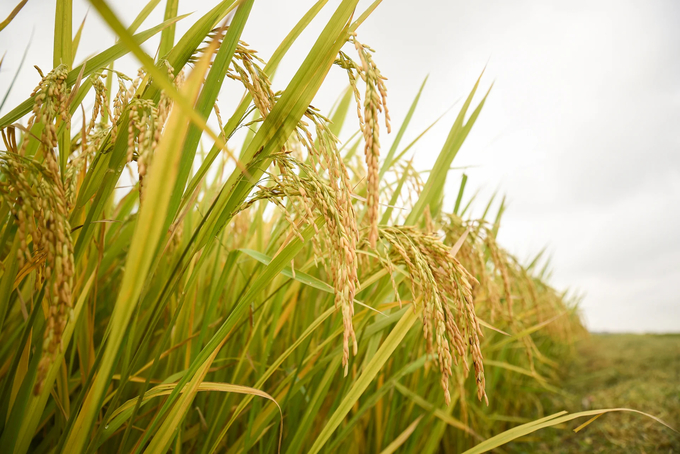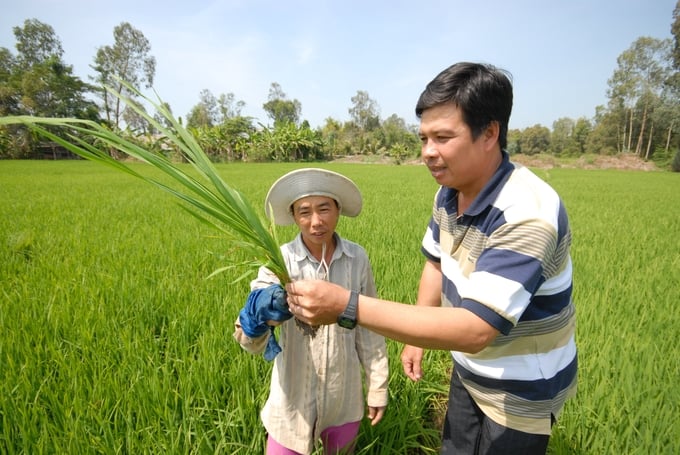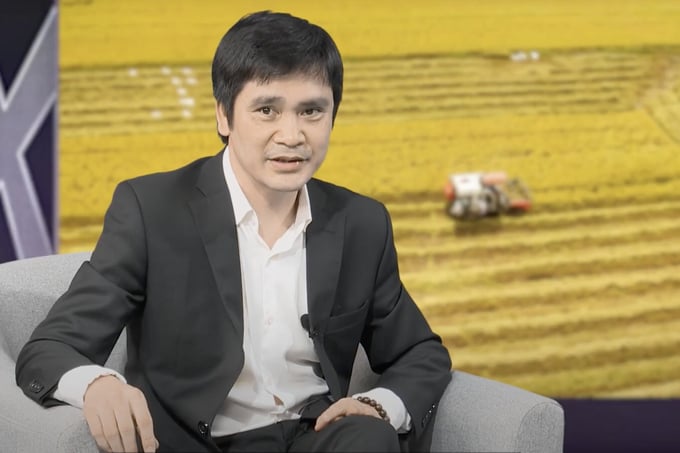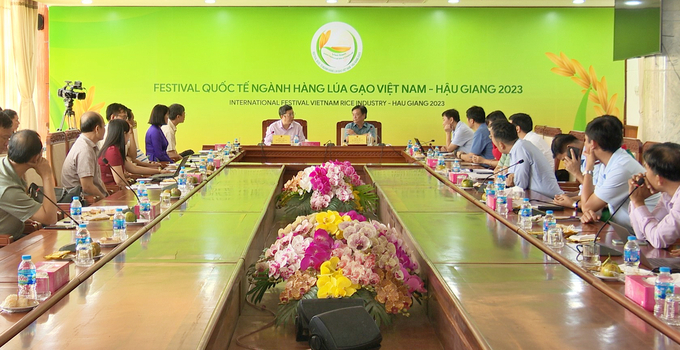November 27, 2025 | 18:05 GMT +7
November 27, 2025 | 18:05 GMT +7
Hotline: 0913.378.918
November 27, 2025 | 18:05 GMT +7
Hotline: 0913.378.918

Vietnamese policy expert discusses challenges and solutions for the One Million Hectares Initiative. Photo: Tung Dinh.
Some difficulties persist as the Vietnamese Government embarks on implementing the One Million Hectares Project. Currently, the foremost challenge lies in the MRV (measuring - reporting - verification) technology necessary to certify that rice cultivation by farmers genuinely results in emissions reduction, enabling their participation in the carbon market.
Additionally, Vietnam must navigate the intricacies of trading carbon credits from low-emission rice production. In recent times, the focus on escalating productivity and expanding acreage has resulted in the intensive use of input resources like fertilizers and pesticides. This poses a significant challenge that necessitates a paradigm shift. Changing the entrenched mindset from traditional practices, akin to those who follow age-old traditions like fish cutting, can be demanding.
Regarding the private sector’s involvement in the Project, Dr. Tran Cong Thang (Director of the Institute of Policy and Strategy for Agricultural and Rural Development – IPSARD) noted: “An often-overlooked aspect is the explicit requirement in the Project’s criteria for the involvement of qualified businesses committed to participation.”
Another challenge arises from the inherent volatility of the rice market. While it is challenging to predict with certainty, specific steps must be taken by 2030, necessitating collaboration from central agencies, scientific organizations, and farmers.

VnSAT project laid the groundwork for the One Million Hectares Project.
Fortunately, the Vietnam Sustainable Agricultural Transformation Project (VnSAT), a flagship initiative of the Ministry of Agriculture and Rural Development, has laid the groundwork, impacting eight provinces across 184,000 hectares. This project provides a foundation for imminent tasks. It reorganized farmers into cooperative groups and cooperatives, followed by collaboration with businesses.
In the 2024-2025 period, the primary focus is consolidating the 184,000 hectares covered by the VnSAT project. VnSAT provinces will register from now until 2024-2025.
From 2026-2030, Vietnam will establish new regions specializing in good agricultural practices, demanding substantial infrastructure investments. Therefore, capital is imperative for the modernization and upgrading of the irrigation system. Subsequently, during this period, the registered provinces will undergo scrutiny based on the four criteria of infrastructure, production organization, business participation, and sustainable rice growth.
In preparing for the specific implementation plan, the MARD worked closely with all provinces during the project development process, adhering to regional planning. With clearly defined, foundational conditions, the provinces will affirm that participating areas will be strategically phased. The MARD, along with the provinces, exercises meticulous care in the execution of this project.

Dr. Tran Cong Thang, Director of the Institute of Policy and Strategy for Agricultural and Rural Development – IPSARD.
“I am optimistic that with this detailed plan, we will execute each step effectively. In the process of preparing this project, the Institute of Policy and Strategy for Agriculture and Rural Development has played a role directed by the MARD leaders. The Government and relevant ministries have also shown keen interest.
The Ministry has collaborated closely with international organizations and multilateral development banks. If the plan proceeds as envisioned, and the implementation progresses smoothly, there may be non-refundable projects in the future,” Dr. Thang shared.
According to the Director, investment serves as both a goal and a solution, along with reorganizing production from individual farmers to cooperatives, integrating businesses into linkages, enhancing the value of internal-external connections, and fostering international collaborations.
Another pivotal solution involves incorporating science and technology to build a systematic process. An illustrative instance is the collaboration with IRRI supporting Vietnam in establishing a straw management process.
Therefore, while it is challenging to synchronize or implement solutions simultaneously, careful preparation and the active involvement of governments from central to local levels, along with businesses, especially those directly linked to production with farmers, supported by international organizations, instill complete confidence that we will undoubtedly succeed.

The Ministry of Agriculture and Rural Development initiates relevant activities to promote rice's value.
Director Thang also addressed ways to mobilize the participation of ministries, branches, localities, as well as international organizations. He highlighted: “At the management level of the Ministry of Agriculture and Rural Development, several units actively participated, including the Department of Crop Production, the Department of International Cooperation, and the Department of Science and Technology.
Moreover, related ministries and branches focused on emission reduction, such as the Ministry of Natural Resources and Environment, were invited to participate from the project’s inception. This inclusive approach extended to international organizations.”
Provincial leaders and the Department of Agriculture and Rural Development in the Mekong Delta made substantial contributions. The active involvement of businesses and cooperatives was notable; many businesses not only participated but also contributed thoughtfully by sharing good practices and models in writing. Therefore, from the project’s initiation, the open-minded approach of leaders fostered consensus.
“This project is progressing on the right track, garnering agreement domestically with consensus from leaders, internationally with support from research organizations, as well as from businesses and localities. I consider this alignment crucial. We must envision a longer-term direction, continuously developing the brand. As Minister Le Minh Hoan also highlighted, we must integrate multiple values to elevate the overall value of rice,” added Dr. Tran Cong Thang.
Translated by Quynh Chi

(VAN) According to Mr. Vo Minh Thanh, Director of the Tay Ninh Department of Agriculture and Environment, Resolution 57 has created a new development pathway for the locality, shifting from traditional toward modern agriculture.
/2025/11/26/4909-2-154329_878.jpg)
(VAN) Pearl grouper farming in HDPE cages not only delivers economic efficiency but also contributes to protecting the environment, creating jobs, and promoting marine-based experiential tourism.

(VAN) The model of making a living under the forest canopy through the agroforestry system in Van Son commune, Bac Ninh province, is expected to generate an annual income of approximately VND 30 million/ha.

(VAN) Many enterprises in Can Tho are harnessing natural energy and reducing greenhouse gas emissions in their production processes, thereby contributing to the promotion of a sustainable green transition.
/2025/11/24/3536-2-112800_176.jpg)
(VAN) Dong Nai now has tens of thousands of hectares of forests certified for sustainable management, and this area will continue to be expanded in the coming period.

(VAN) Vinh Ha hamlet (Dai Xuyen commune, Hanoi) is shifting away from small-scale farming as households adopt bioscurity into their breeder chicken models.

(VAN) Heavy rains make aquatic species more vulnerable to disease. Proactive water management and high-tech systems help farmers prevent outbreaks and protect yields.